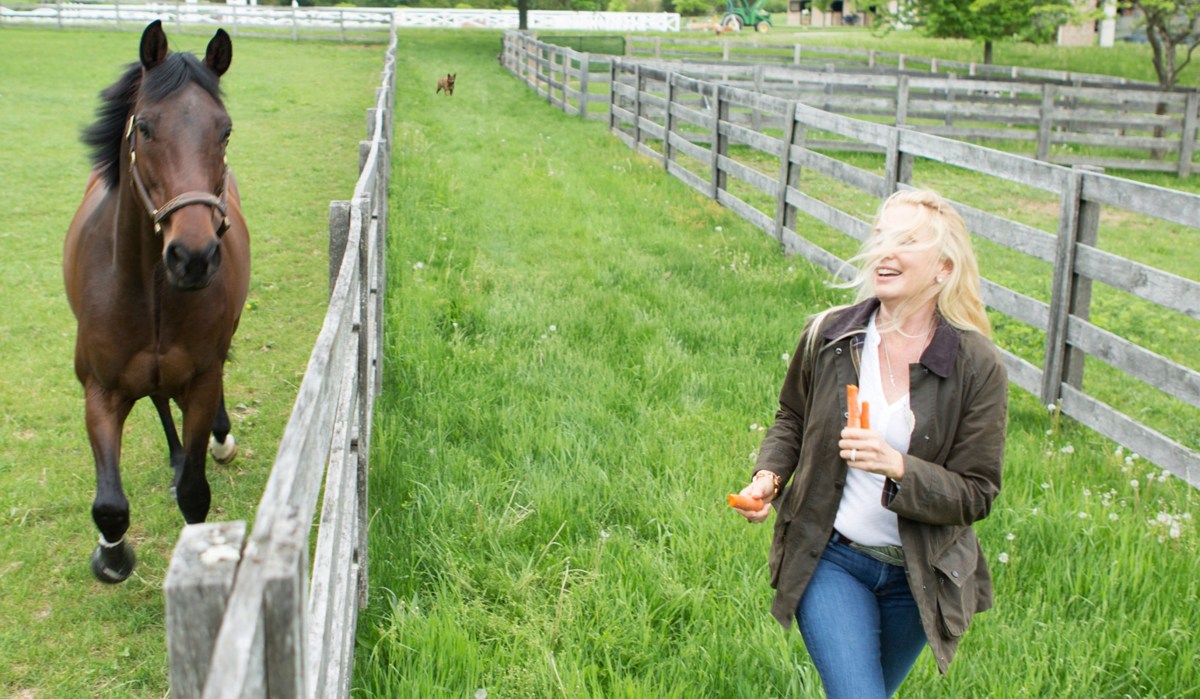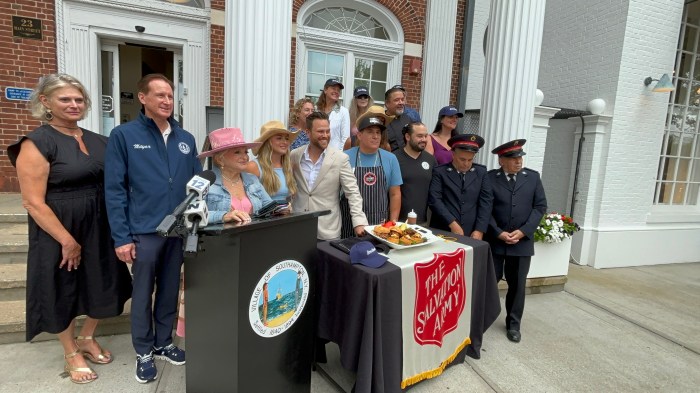Wild horses that roam America’s Western rangelands descended from indigenous populations and were not all imported from Spain — an important distinction that means mustangs have been misclassified as an invasive species.
Those findings in a recent scientific study are among the revelations that Manda Kalimian, the founding president of the East Norwich-based nonprofit wild horse advocacy organization, the CANA Foundation, makes in her new book, Born To Rewild: Triumphs of a Now Fearless Woman, which was published on Oct. 1. Her goal is to stop federally funded roundups of wild horses, which are then auctioned off, sometimes to slaughterhouses abroad.
“Even if you don’t care so much about horses or it’s not your thing, it’s shocking,” Kalimian says. “That was my way of reaching out to the American people to say, ‘Do you want your taxes spent this way? The government is destroying our environment and our wild horses along with it. And you don’t even know that $120 million of your tax dollars is going to this.’”
According to the U.S. Bureau of Land Management (BLM), more than 51,000 rounded-up wild horses and burros are being penned at government holding facilities as of August. More than 86,000 still roam rangelands in 10 Western states as of March, including California, Nevada, Arizona, Utah, and Oregon, according to the BLM. The BLM, which oversees 177 herd management areas, has been herding wild horses with helicopters, storing them in pens, and putting them up for adoption for the past two decades.
Kalimian’s book comes amid the 50th anniversary of the 1971 Wild Free-Roaming Horses and Burros Act, which tasked the federal government with managing the nation’s mustangs. She spoke with the Press about the goal of her advocacy, why the public should back her efforts, and what comes next. This conversation has been edited for clarity and length.
What inspired you to write your book?
The inspiration for the book was to share my journey and who I have become because of it, and in doing so educate the public as to what the issues are — why the horses need our help, what’s happening environmentally; and why public rangelands, the environment, and the wild horses are critical to our survival.
What are you hoping that readers take away and learn from reading the book?
They should know this is what the government is doing. This is how your taxes are being spent, and this is a contributing factor to why we have wildfires, droughts, and pandemics — all these things are connected — and to understand the importance of all of these things in our lives.
How has the issue evolved since you founded CANA?
Since I founded the organization nearly 14 years ago, there has obviously been a huge shift in understanding the effects of climate change. We feel it in our everyday lives. I was able to get language written into U.S. legislation that for the first time includes the term “rewinding,” as a management tool for wild horses on our public lands. We are beginning to see the term adopted on a much larger scale now.
What was the significance of getting the rewilding language into the Appropriations Budget Bill?
The significance is that the language is already written and accessible to be used and put into effect. The hope is that we can get the right congressional leaders to want to appropriate funding for wild horse-led rewilding initiatives and BLM program adjustments that will see wild horses treated with the respect that they deserve as a native and keystone species, as an integral part of the natural system in helping to restore these public grasslands. Rewilding using wild horses is a legitimate environmental practice that can help restore balance to grasslands by building biodiversity, and of course that is the key to mitigating carbon to stop desertification due to climate breakdown.
Are you any more optimistic that things will change for the better with the new
administration?
I was more optimistic initially, but like all bureaucracy, change is just an arduous task. The United Nations Environmental Program came out with a scathing statement in September about how much trouble we are in due to climate change and global warming. With every decade, it’s going to be harder and harder to stop the loss if all of us don’t take this seriously.
What is the significance of the finding that horses are a North American native species, despite claims to the contrary?
That is groundbreaking. The government [doesn’t] want the horse to be a native species: They don’t want the horse to have certain protections that a native species would have because they want to use the lands for other things, other businesses and industries. They treat these horses as invasive species that are like cockroaches on the land so they can round them up by the hundreds. It’s horrifying to see. The perception that is being portrayed about the horses is simply not true.
Stephanie Boyles Griffin, the senior scientist of the Humane Society of the United States’ Wildlife Protection Department, was quoted recently saying that the greatest threat to mustangs isn’t BLM, ranchers, or miners, it’s climate change, but you say otherwise. Why is that?
Climate change is the greatest threat to all of us, but the government’s mismanagement of our public rangelands is a key contributing factor to climate breakdown. Cattle ranching without properly managed grassland ecology and grazing practices is a quantifiable contributing element to environmental decline. One of the largest contributors to methane emissions, the largest contributor to ozone destruction, is cattle ranching, not to mention fracking, oil, coal mining, and other destructive threats to the land. It’s part and parcel of the same thing. If the horses live on the land that the cattle are continually being farmed on and they are continually eating down the grass in a way that the horses don’t (pulling it out by the roots with their tongues rather than slicing it with their teeth), and they keep defecating in the way that they do, releasing methane emissions, then it’s all part of the same story. The land will be stressed and it is becoming harder and harder for the land to recover. Yes, climate change is the greatest threat to all species, but you have to go back and look at why we have climate change.
What was the reaction like to the recent op-ed you wrote in the Los Angeles Times titled “Let wild horses do their part to save the West?”
I am so pleased and excited that journalists are wanting to know more about the climate and environmental pieces now; they’re not just focused on the surface. People are more interested now, because everyone’s living this experience of erratic weather patterns and diseases — this is our future. People are now paying attention and interested in what we are talking about, the why’s and the whats.
Washington state Department of Fish and Wildlife commissioner Kim Thorburn called your letter to the Los Angeles Times “wildly off base” and that it’s the overpopulation of wild horses in the West that’s creating a crisis. How do you respond?
I’m happy to have a conversation about that. They say, you’ve never seen destruction until you see what it looks like from horses. I understand that some people have been trained and educated to see things through this lens and sure, because the public lands have been mismanaged to such a degree, and so much of this land allocated to the horses has been taken away from them over the years, of course there is going to be land that is destroyed. But it’s from the imbalance, the mismanagement, the overuse we have created that has become a vicious cycle causing the effects of global warming. You can’t just tell one part of the story without knowing the beginning.
What are the most important goals you still have ahead?
The awareness is the most important thing, so we need to create a huge groundswell. We want a grassroots movement. The next piece of this is that we want everyone to know, and question, and ask, and be a part of the solution and get these horses on lands — tribal lands, public lands, native lands, private lands — and get the boots on the ground for rewilding projects and going out West as well as in our backyards. Every single one of us can play a role in helping, no matter how big or small. We must take all of this seriously: The future of our planet and our children are dependent on it.
Manda Kalimian is the president and founder of the CANA Foundation, which supports
rewilding in the American West. Her book “Born to Rewild” was published Oct. 1.































